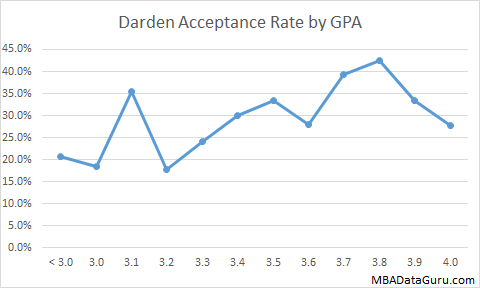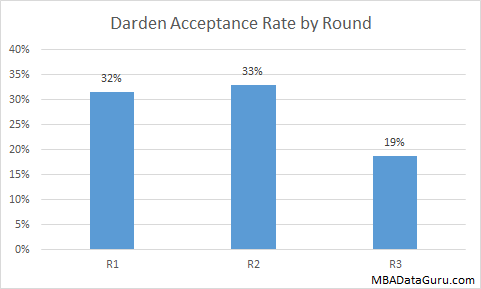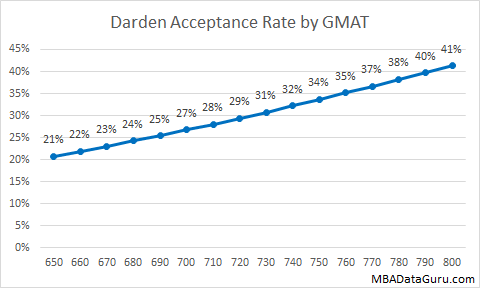Many applicants may wonder if their undergraduate major impacts their chance of getting into business school. Admissions data suggests that your college major can significantly impact your probability of getting into business school. The general trend seems to be that majors that are more dominated by women have a higher acceptance rate while industries that dominated by men had lower acceptance rates. This could be because my data does not have gender as a variable, so I could not account for it. Many people believe that women’s acceptance rate is higher than it is for men with similar credentials, but I have not found any data that proves it. Another explanation is that the female dominated majors are generally underrepresented in business school application pools, so when schools aim to diversify the class, the acceptance rates are higher for those majors. Continue reading
Tag Archives: Application
MBA Waitlist Acceptance Rate Analysis (with Class of 2019 data)
 One of the most frustrating parts of the MBA application process is waiting to hear back from the schools. First, applicants have to wait to hear if you will be interviewed. Next, an applicant must wait to hear if they have been admitted. Some unlucky souls will have to wait a third time on the waitlist, sometimes for up to 8 months if they are a round 1 applicant. I created this updated MBA waitlist acceptance rate analysis to provide some transparency to those who are on the waitlist. Continue reading
One of the most frustrating parts of the MBA application process is waiting to hear back from the schools. First, applicants have to wait to hear if you will be interviewed. Next, an applicant must wait to hear if they have been admitted. Some unlucky souls will have to wait a third time on the waitlist, sometimes for up to 8 months if they are a round 1 applicant. I created this updated MBA waitlist acceptance rate analysis to provide some transparency to those who are on the waitlist. Continue reading
MBA Interview Probability for top schools by GMAT and GPA
With round 2 application deadlines rapidly approaching, many applicants may wonder what their chance of getting an MBA interview with their favorite schools is. I analyzed the MBA interview probability for the top 25 schools over the past 5 years by GMAT and GPA. Unsurprisingly, for most schools the MBA interview chance increased for high GMAT and high GPA candidates. Continue reading
Military MBA Acceptance Rate Analysis
 Transitioning from the military to MBA is a fairly popular path to follow. A little over 4% of MBA applications come from military veterans. When looking at the data comparing military applicants to traditional MBA applicants, a few trends become clear:
Transitioning from the military to MBA is a fairly popular path to follow. A little over 4% of MBA applications come from military veterans. When looking at the data comparing military applicants to traditional MBA applicants, a few trends become clear:
- Military / Veteran applicants tend to be a year or two older.
- Scores for military applicants are a little lower on average, about 15 points on the GMAT and about .15 for GPA
- Military applicants on average have another year or two of work experience
- Military MBA acceptance rate is about 50% higher than the acceptance rate for traditional applicants
- Some schools have a very large advantage for military applicants while others have little to no advantage
Best Schools for Young MBA Applicants
Deciding when to start applying to business school can be a challenge. Salary increases dramatically after an MBA, but schools tend to prefer applicants with more work experience. I looked at the top 25 US MBA programs’ admission data to find the best schools for young MBA applicants in terms of chance of being admitted. I analyzed the MBA acceptance rate by age to see which schools had the smallest disadvantage for younger applicants relative to traditionally aged MBA applicants. Continue reading
Updated MBA Acceptance Rate by Round
The third round of MBA applications is notorious for having a lower acceptance rate. With the third round application deadlines approaching quickly for most business schools, you may be wondering if the stereotype about the third round is fact or fiction. I updated my analysis of MBA acceptance rate by round with the last 2 years of data and I expanded it to include Olin, Georgetown, USC, Arizona State and Vanderbilt.
This analysis was done using self-reported data from GMAT Club. Data from the class of 2014 through the class of 2018 was used because otherwise there would not be enough data for round 3 and 4 to accurately capture the acceptance rate. Continue reading
MBA Round 3 Application Deadline
It is mid March and the application season for the class of 2019 is winding down. If you plan to apply for this year, you should check the MBA Round 3 Application Deadline for the school of your dreams because it is fast approaching or already past. Also, check out the MBA acceptance rate for round 3 at the schools you are considering. Continue reading
INSEAD Acceptance Rate
 This article will analyze the model I built to predict INSEAD acceptance rate. INSEAD is a graduate business school in France, near Paris. It has two additional campuses in Singapore and Abu Dhabi. In addition to the MBA program, INSEAD also has an Executive MBA, Masters in Finance and a PHD in Management. Unlike most business schools in the US, INSEAD’s full-time program only offers a 1-year MBA. INSEAD students can either start in September or January. The January start is a 12-month program for students who would like to do an internship. The September start is a 10-month program. INSEAD prides itself on being a global business school, thus, it requires applicants to speak two languages fluently before being admitted. In order for a student to graduate, they must speak three languages. On average, INSEAD MBA acceptance rate is 31%. The average GMAT is 703 and the average GPA is 3.5. Continue reading
This article will analyze the model I built to predict INSEAD acceptance rate. INSEAD is a graduate business school in France, near Paris. It has two additional campuses in Singapore and Abu Dhabi. In addition to the MBA program, INSEAD also has an Executive MBA, Masters in Finance and a PHD in Management. Unlike most business schools in the US, INSEAD’s full-time program only offers a 1-year MBA. INSEAD students can either start in September or January. The January start is a 12-month program for students who would like to do an internship. The September start is a 10-month program. INSEAD prides itself on being a global business school, thus, it requires applicants to speak two languages fluently before being admitted. In order for a student to graduate, they must speak three languages. On average, INSEAD MBA acceptance rate is 31%. The average GMAT is 703 and the average GPA is 3.5. Continue reading
Optimal MBA Application Number
Many business school applicants wonder how many MBA applications they should submit? In this article, I will discuss the optimal MBA application number based on real data. Deciding on your MBA application number is challenging because the more schools you apply to, the less time you have to spend on each application. On the other hand, you don’t want to put all of your eggs into one or two baskets. The data suggests that the ideal number of MBA applications is 5 to 7. For more information, check out this article on how to build your portfolio of MBA applications co-authored by Lawrence Linker and I. Continue reading
MBA Acceptance Rate by Concentration
With the current semester just about over, next years application essay questions will be posted in the coming weeks for many schools. Round one applicants should start figuring out their story and crafting their essays. The most important essay for most schools is the question: Why get an MBA and why is [insert school name here] the right choice for you? In order to answer this question you need to have a plan for how an MBA is going to help you achieve your goals. The vast majority of MBA students are looking to switch careers. Why else pay $120,000 in tuition and give up two years of salary? If you wanted to stay in the same industry, you would probably just go for a promotion or switch companies. Continue reading
Darden MBA Acceptance Rate Analysis
Darden, UVA’s business school, is the business school ranked 11th in the US. Darden is a prestigious school and only 25% of applicants are accepted. I built a predictive model to see which factors are most and least important for Darden admission, the results may surprise you.
Darden MBA Acceptance Rate by GMAT
It is not shocking that increasing your GMAT will raise your Darden admission chance. The average GMAT score for accepted students at UVA’s business school is 706. If you were to increase your GMAT by 100 points from 650 to 750 when applying to Darden, you would raise your acceptance rate by an impressive 62%. Even at a GMAT score of 650, chance of acceptance is still over 20%.
Darden MBA Acceptance Rate by GPA
 Shockingly, GPA has little to no impact on your chance of admission to Darden. The average GPA of accepted students is 3.52. When I ran a regression model on factors that predict the chance of acceptance at Darden, GPA was one of the first variable eliminated. The graph above confirms my conclusion, a person with a 4.0 GPA has only a slightly higher chance of admission than a person with a 3.0. If you have a low GPA and a high GMAT, then Darden is a great school for you.
Shockingly, GPA has little to no impact on your chance of admission to Darden. The average GPA of accepted students is 3.52. When I ran a regression model on factors that predict the chance of acceptance at Darden, GPA was one of the first variable eliminated. The graph above confirms my conclusion, a person with a 4.0 GPA has only a slightly higher chance of admission than a person with a 3.0. If you have a low GPA and a high GMAT, then Darden is a great school for you.
Darden MBA Acceptance Rate by Round

Recently I performed an analysis of MBA acceptance rates by application round. The Darden MBA acceptance rate was noticeably lower during round 3. When building the Darden predictive model I confirmed that the low round 3 acceptance rate was in fact statistically significant. Although round 3 applicants still have a fairly reasonable 19% acceptance rate, it is still significantly lower than the round 1 and 2 Darden admission rates. If you are on the fence about applying round 3 to Darden, you might as well wait for next year.
Other Darden MBA Acceptance Rate Factors
Similar to Wharton, Darden MBA applicants from India have roughly a 75% lower chance of admission. Computer science majors also have a similarly low chance of being accepted, coming in at 11%.
MBA Admissions Process Advice
The MBA admissions process is long and difficult. It is no wonder that many people pay a lot of money to hire admissions consultants to help them with the process. This article will help you to understand the critical parts of the application process.
MBA Admissions Process Components
- GMAT
- Resume
- Recommendations
- Essays
- Application
This list of components for an MBA application is ranked from most important to least important as far as I’m concerned. Every school worth going to will have all of these components, if not more
- GMAT – All top MBA programs require the GMAT (or GRE). It is extremely important for admissions. If you want to be admitted to a top ten school then shoot for 700+. Preferably 720+ given that GMAT scores at top schools have been on the rise in recent years due to more international applications.
- Resume – The resume is made up of your work experience, leadership experience, undergraduate school and interests. The truth of the matter is that business schools care a lot about name brand for the companies you have worked at as well as the undergraduate school you attended. If possible try to work at a desirable company such as Google, Goldman Sachs or McKinsey but at the very least, try to have at least one company on your resume that a normal person will have heard of. For additional advice, check out my article on improving your resume.
- Recommendations – Your recommendations are critical! If any of your recommenders give you even lukewarm recommendations then you can kiss your acceptance goodbye. Everyone gets good recommendations because we all pick people that like us. It is helpful to pick alumni of the school if possible or at least people that have an MBA. Recommenders who don’t have an MBA probably won’t understand the process and what the admissions committee is looking for. If your recommender did not go to a top MBA school, spend some time explaining to them what schools are looking for in a recommendation.
- Essay – The essay is your chance to explain to the admissions committee why you are a good fit and why you need an MBA. You should do as much research as possible for each school before writing the essay so that you can tailor it to the school. In researching a school you should use their website, visit the school and network with currents students/alumni. I can’t stress enough networking with current students. They recently went through the same process that you will be going through and they know what the culture of the school is. If you really befriend a student they may even help you by editing your resume and essays, but don’t expect it. If I were you I’d avoid asking too much of the tour guide who shows your around because they meet hundreds of prospective students a month and don’t have enough time to spend helping every one. Instead I would ask the tour guide to connect you with a student who is in the area in which you are interested. For example, if I were applying again then I would email the tour guide and ask them to connect me with someone who knows about financial services consulting or maybe someone who did an internship at XYZ consulting company. This gives the guide the option of passing you off to a friend of theirs who doesn’t get as many emails from prospective students. That person will probably be willing to spend more time talking to you.
- Even after you have done all the other components of the application you will still have to fill out the actual application. It typically takes two or three hours and will require you to have all the information about each job you worked and degree you received. If you have ever gotten into trouble, most schools ask if you were ever on probation or arrested, so have an answer ready.

